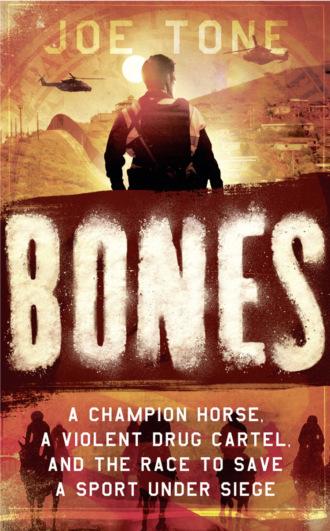
Полная версия
Bones: A Story of Brothers, a Champion Horse and the Race to Stop America’s Most Brutal Cartel
José surely knew he worked harder than his paychecks suggested. The incomes of immigrants were systematically stubborn, especially in Texas, where so-called right-to-work laws suppressed union organizing and wages. Texas bricklayers made less than those in most every other state, and 50 or 60 percent less than those in Illinois, California, and New York.
José did manage the occasional pay bump, and he was up to $20 an hour by 2009, from $16.50 when he’d started his previous job. He could load up on hours, too. He’d clocked 240 hours of overtime in his first full year at his new job, including 28 overtime hours one week when the average temperature was 104 degrees.
Still, it was hard to do any more than survive. That’s why they were stuck on their stubby street in Balch Springs, one of the inner-ring suburbs southeast of Dallas. Seventy-five percent of the suburb was black or Hispanic. Almost a quarter were immigrants. Half of the people there spoke something other than English at home. A quarter lived in poverty. The rest lived where the Treviños did, just above it, with the city’s median household income barely scraping forty grand.
If this was the American Dream, it was a sweaty, stressful version of it, land of the free but also of the overdraft fee. The Treviños kept a savings account, but it had never held more than $100. Their checking account had topped out in recent years at $8,692, and that was after a $4,900 tax refund. Most months it hovered around a couple grand. It wasn’t much, but it was enough to take the kids back-to-school shopping at American Eagle and Limited Too; to dine on whatever they could afford at Carnival, the Latin-food grocery chain; to load up at Walmart; to make small donations to the March of Dimes; and to pay for Alex’s braces. And, soon, to help Alex pay for college.
She was their biggest investment, really, the asset they nurtured in hopes that it would pay off for future Treviños. In this and other ways, José and his brothers seemed rooted by the same qualities. They were strivers, willing to bust their butts for what they felt they deserved, and willing to take risks to accelerate their return on investment, which was sluggish by design and decree. They just assessed that risk differently. Kiko had tried to complement his legal shipping business with illegal shipping. His other brothers, the ones José was visiting at the ranch, had written off their own futures in pursuit of riches that paid out sooner and bigger.
José was playing a longer game. If he stayed the course, his American Dream would be deferred to his daughter and her siblings. José may never experience the payoff, but perhaps one day he could see it in her round, beaming face. He made sure to pay the orthodontia bill.
Despite the relentlessness of this life, and despite the travel ordeal, José managed to get to Piedras Negras for the party at Miguel’s ranch. There were four or five structures on the property, including stables for the horses and a sprawling house, and outside a cook grilled meat and veggies. José found his way under the palapa and sipped from his beer.
A man named Poncho approached. Poncho was one of Miguel’s guys, known for his skills as a logistics manager, overseeing the exportation of vast quantities of cocaine into the United States, and the importation of millions of dollars back into Mexico.
José told Poncho about his life. How he’d grown up like this, in the country, among the animals. How he worked as a bricklayer—“like a regular person” were the words that would stick with Poncho. They sat there for hours, drinking and talking.
From the palapa, José could surely see that his brother had managed to remake their old life on this ranch. A couple of calls and Poncho could cut José into all this, no sweat. But José told Poncho no, that he “didn’t want to have anything to do with what was crooked.” The code of familism seemed to have found its limit. So they just sat and drank beers while the sun set on the ranch of the man they called “Cuarenta.”
Конец ознакомительного фрагмента.
Текст предоставлен ООО «ЛитРес».
Прочитайте эту книгу целиком, купив полную легальную версию на ЛитРес.
Безопасно оплатить книгу можно банковской картой Visa, MasterCard, Maestro, со счета мобильного телефона, с платежного терминала, в салоне МТС или Связной, через PayPal, WebMoney, Яндекс.Деньги, QIWI Кошелек, бонусными картами или другим удобным Вам способом.


